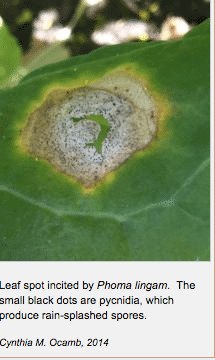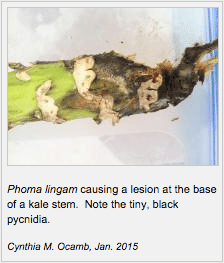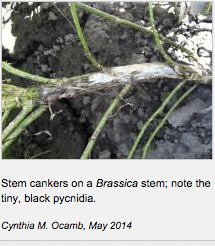No FOMO* for Phoma
There are plenty of things about Oregon’s Willamette Valley that are worthy of FOMO, or the *Fear of Missing Out. We have mild winters, fertile soils, & natural beauty abounds. Phoma lingam, however, is not FOMO-worthy. Since 2014, the Willamette Valley has been hit with Phoma lingam, aka Black Leg, a fungal disease that affects all species of Brassica family plants including kale, cabbage, turnips, & many other important food crops, as well as many common weeds such as wild mustard. Black leg causes stunted growth, girdling of the stem, & can lead to great reductions in yield & sometimes plant death. It is estimated that around 10,000 acres of Willamette Valley brassicas were infected in 2014, & similar numbers may have been infected in 2015.



What is being done about it?
The disease is thought to have come in on infected seed, & so in response the Oregon Department of Agriculture (ODA) has passed an administrative rule requiring all Brassica seed that will be planted in the Willamette Valley in quantities over 1/2 oz, to have been tested from a qualified, approved laboratory, and to be treated for the disease, even if the test results are negative.
At Adaptive Seeds, seed quality is a priority & we are committed to providing seeds that exceed our customers’ expectations. Even though most of our Brassica varieties are not sold in packages over 1/2 oz, we have decided to test all of our Brassica seed lots, & all of the test results so far have been negative. At this point, we are not treating any of our seed prior to sale.